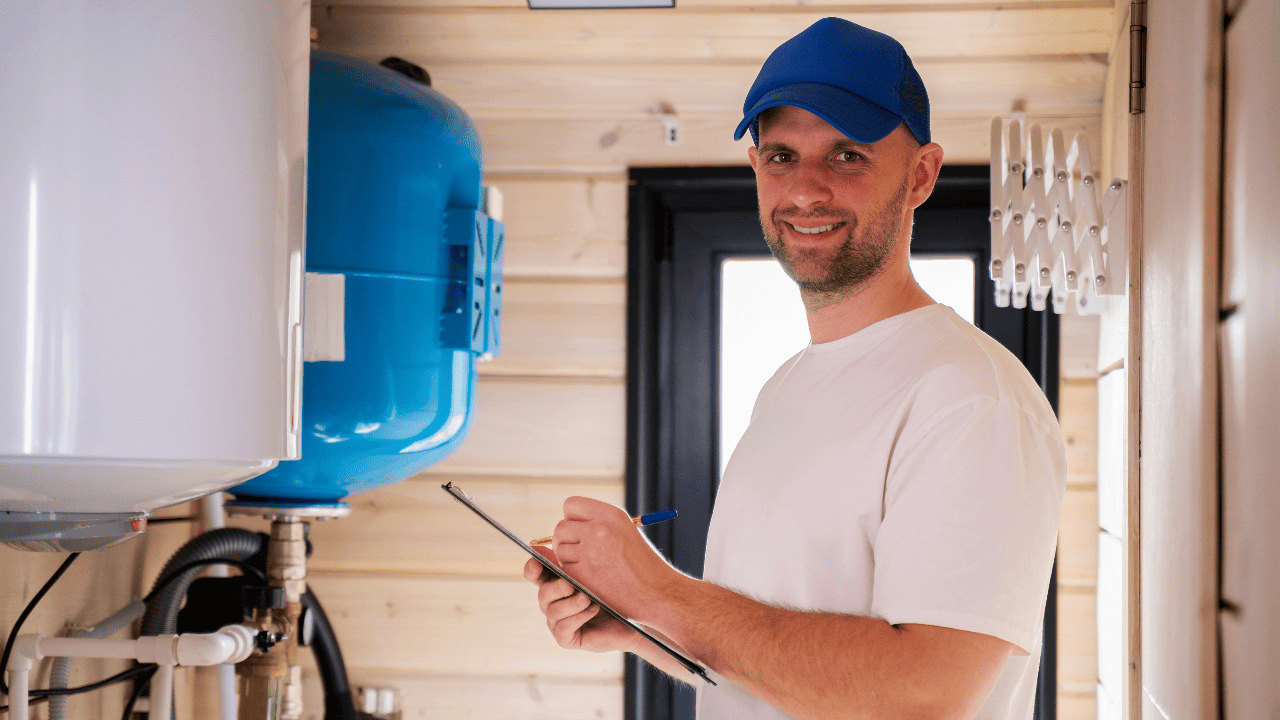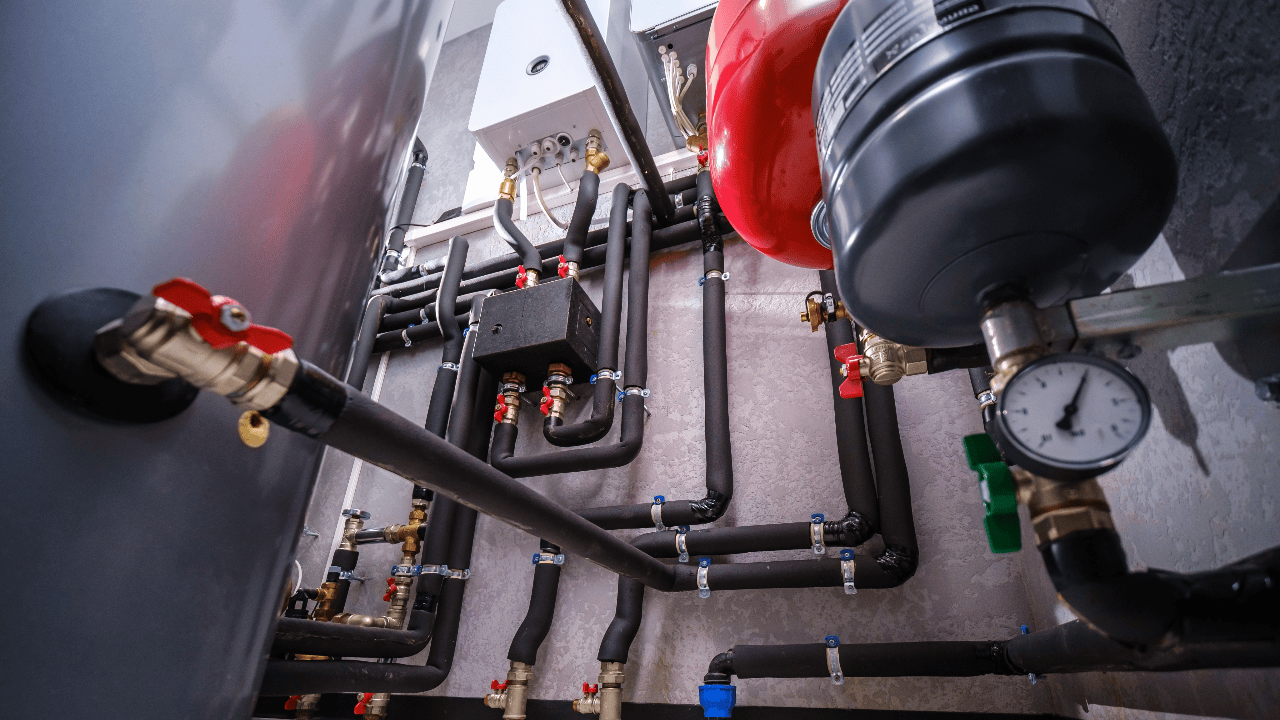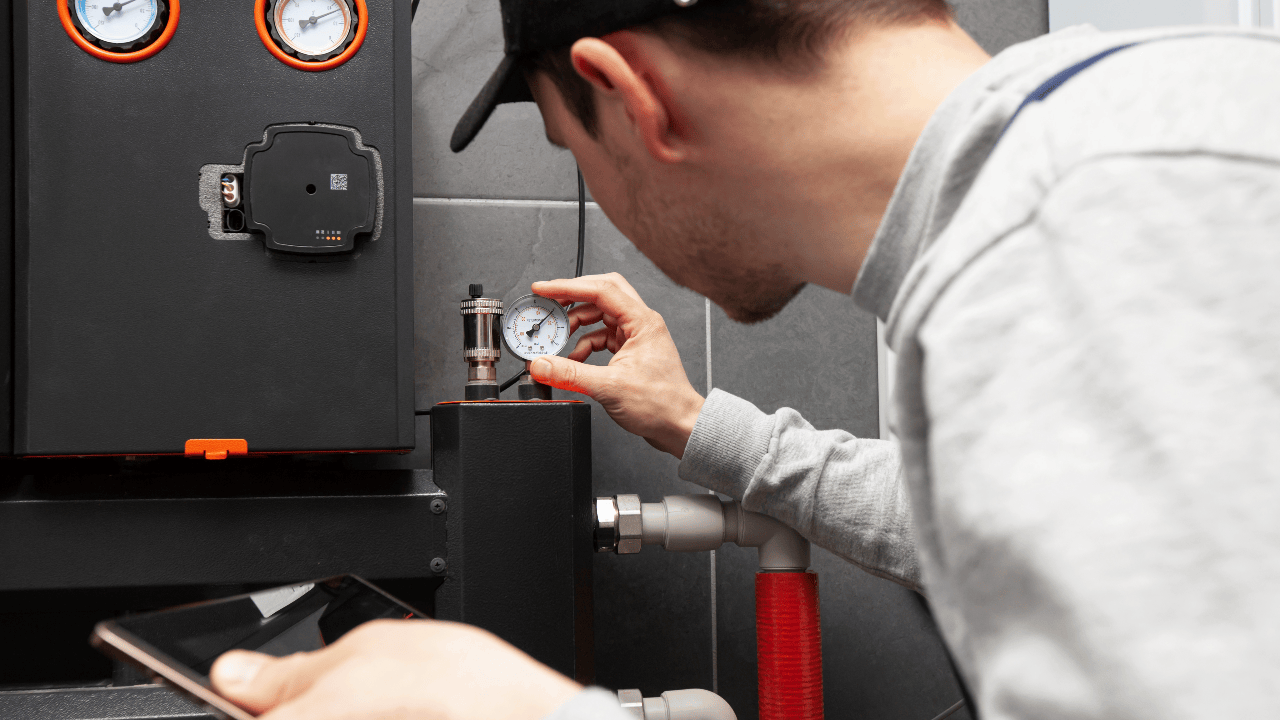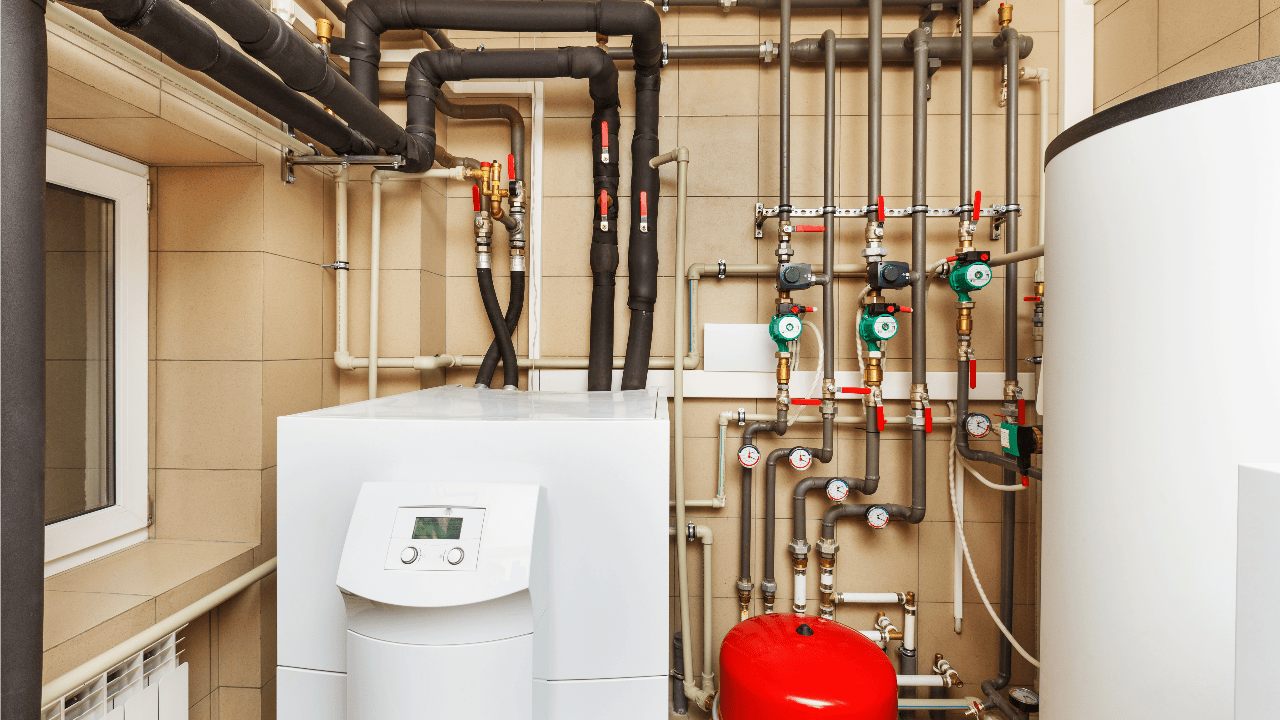What Are Geothermal Heat Pumps? Are They Worth It?
By HeyHome • November 29, 2023

In an era where energy efficiency and environmental sustainability are at the forefront of technological advancements, geothermal heat pump systems have emerged as a revolutionary solution. These systems, harnessing the consistent temperatures of the earth, provide a remarkably efficient way to heat and cool our homes. Unlike traditional heating and cooling methods that rely heavily on fossil fuels or electricity, geothermal heat pumps tap into the natural heat stored underground, offering a greener and more cost-effective alternative.
This blog post delves into the world of geothermal heat pumps, unraveling the science behind how they work and why they're becoming an increasingly popular choice for modern homeowners. We'll explore everything from the basic principles of geothermal heating and cooling to the intricacies of installing a geothermal heat pump system. Our journey will take us through the benefits of these systems, not just in terms of energy savings and reduced carbon footprint but also in their ability to provide consistent, comfortable heated or cooled air throughout the year.
Moreover, we'll compare geothermal heat pumps with other types of heat pumps, like air source heat pumps and ground source heat pumps, to give you a comprehensive understanding of your options. By examining factors such as installation costs, maintenance requirements, and overall efficiency, this post aims to answer a crucial question: Are geothermal heat pumps the right choice for your home?
Whether you're considering a shift to a more sustainable living or simply curious about the latest in heating and cooling technology, this guide offers valuable insights. So, let's embark on this journey to discover the potential of geothermal heat pump systems and how they stand to redefine our approach to residential climate control.
Join our newsletter
Stay on top of the latest in landscaping and lawn care with one valuable tip right in your inbox every Saturday morning.
Understanding Geothermal Heat Pumps
Geothermal heat pumps, a cornerstone of modern sustainable living, harness the earth's natural heat for home climate control. Unlike conventional heating and cooling systems, they tap into the consistent temperatures beneath the earth's surface.
These systems consist of an underground loop of pipes, a heat pump, and a distribution system within the home. During the winter, the heat pump extracts warmth from the ground through the pipe loop, heating the home efficiently.
Conversely, in summer, the process reverses. The system extracts heat from the home and transfers it to the cooler ground. This dual functionality provides both heating and cooling, making it an all-in-one solution.
One of the key components is the ground loop system. This can be installed horizontally or vertically, depending on the property's characteristics. It circulates a water-antifreeze solution to facilitate heat transfer.
Inside the home, the heat pump's heat exchanger and compressor work to adjust the temperature of the air, either warming it in the winter or cooling it in the summer. This treated air is then distributed throughout the home.
Overall, geothermal heat pumps stand out for their efficiency. By utilizing the stable underground temperatures, they offer an environmentally friendly, cost-effective alternative to traditional HVAC systems.
For more details on how geothermal heat pumps can revolutionize home heating and cooling, explore further at HeyHome.
The Benefits of Geothermal Heat Pumps
Environmental Advantages
Reduced Carbon Footprint
Geothermal heat pumps significantly lower greenhouse gas emissions compared to traditional heating and cooling systems. By using the earth's natural heat, they diminish reliance on fossil fuels.
Sustainable Energy Source
These systems utilize renewable energy from the ground, making them a more sustainable option than conventional methods that often depend on non-renewable resources.
Minimized Ecological Impact
The installation and operation of geothermal systems have a lesser impact on ecosystems. Their underground components blend seamlessly with the environment, preserving natural landscapes.

Long-term Cost Savings
Lower Energy Bills
Though the initial setup cost is higher, geothermal systems are more energy-efficient, leading to substantial reductions in monthly energy bills.
Increased System Longevity
Geothermal units typically have a longer lifespan due to their underground components being protected from weather elements, leading to fewer repairs and replacements.
Government Incentives
Many regions offer financial incentives like tax credits for installing geothermal systems, helping to offset the upfront costs and making them a more financially viable option.
In summary, geothermal heat pumps offer both environmental and economic benefits, making them a wise choice for sustainable and cost-effective home heating and cooling. Explore more about these advantages at HeyHome.
Comparing Geothermal Heat Pumps and Air Source Heat Pumps
When exploring options for sustainable heating and cooling systems, homeowners often weigh the merits of geothermal heat pumps against air source heat pumps. While both systems are designed to provide efficient climate control, they have distinct differences in their operation, efficiency, and overall performance.
Key Differences Between Geothermal and Air Source Heat Pumps
- Source of Heat: The primary difference lies in their heat sources. Geothermal heat pumps, also known as ground source heat pumps, utilize the earth's consistent underground temperature. In contrast, air source heat pumps draw heat from the outdoor air, which can be less efficient in extreme temperatures.
- Installation: Geothermal systems typically require more extensive installation, including the placement of a ground loop system. This often results in higher upfront costs compared to the relatively simpler installation of air source heat pumps.
- Environmental Impact: Geothermal heat pumps have a lower environmental impact, given their reliance on the stable, renewable energy of the ground. Air source heat pumps, while still efficient, may rely on electricity generated from fossil fuels, depending on the local energy grid.
Efficiency and Performance Comparison
- Energy Efficiency: Geothermal heat pumps generally offer higher energy efficiency ratios due to their use of consistent ground temperatures. This efficiency leads to more effective heating and cooling, particularly in regions with extreme weather conditions.
- Operational Costs: The initial installation costs of geothermal heat pumps are offset by their lower operational costs over time. Air source heat pumps, while cheaper to install, may incur higher costs in the long term, especially in colder climates.
- Longevity: Geothermal systems often have a longer lifespan compared to air source systems, owing to their underground components being protected from weather-related wear and tear.
In conclusion, both geothermal and air source heat pumps present viable options for energy-efficient heating and cooling. The choice largely depends on individual preferences, budget constraints, and environmental considerations. For a deeper dive into the world of heat pumps and their benefits, check out HeyHome's comprehensive guide.

Installation and Maintenance of Geothermal Heat Pump Systems
Installing a geothermal heat pump system is a significant step towards energy-efficient living. Understanding the installation process and maintenance requirements is crucial for homeowners considering this sustainable option.
Installation Process of a Geothermal Heat Pump
- Site Assessment: The first step involves a thorough site assessment to determine the suitability of your property. Factors like soil composition, available space, and local climate are considered to design an efficient system.
- Choosing the Right System: Based on the assessment, a suitable type of geothermal system is selected. Options include horizontal, vertical, open loop, or closed loop systems, each tailored to specific site conditions.
- Installation of the Ground Loop: The ground loop, a critical component of the system, is installed underground. Its design and depth depend on the chosen system type and local ground conditions.
- Connecting Indoor Components: After installing the ground loop, the indoor components of the geothermal heat pump are connected. This includes the heat pump unit, ductwork, and thermostat.
- System Testing: Finally, the entire system is tested to ensure it operates efficiently and effectively, providing comfortable heating and cooling.
Maintenance Requirements and Tips
- Regular Inspections: Regular inspections by a qualified technician are recommended to ensure optimal performance. This includes checking the heat pump, ductwork, and ground loop components.
- Filter Maintenance: Like conventional HVAC systems, the filters in a geothermal heat pump should be checked and replaced regularly to maintain air quality and system efficiency.
- Monitoring Performance: Homeowners should monitor their system's performance, keeping an eye out for any changes in heating/cooling efficiency or unexpected increases in energy consumption.
- Professional Servicing: Periodic professional servicing is essential to address any wear and tear and to keep the system running smoothly for years.
Geothermal heat pump systems require thoughtful installation and routine maintenance to maximize their lifespan and efficiency. For more detailed information on installation and maintenance, explore HeyHome's expert guides.
Join our newsletter
Stay ahead of the curve in all things outdoor.
Get the inside scoop on the latest landscaping, lawn care, and fencing trends with 1 actionable tip every Saturday morning.
Cost Analysis: Are Geothermal Heat Pumps Worth the Investment?
Evaluating the financial feasibility of geothermal heat pumps involves comparing the initial installation costs with long-term savings and contrasting these expenses with those of traditional heating and cooling systems.
Initial Installation Costs
The upfront cost of installing a geothermal heat pump system is generally higher than that of conventional systems. This cost encompasses site assessment, installation of the ground loop, and the heat pump unit itself. However, it's important to note that various incentives like tax credits can help mitigate these initial expenses.
Long-Term Savings
Once installed, geothermal systems offer significant savings on energy bills due to their high efficiency. Over time, these savings can more than compensate for the higher installation costs. Additionally, the durability of geothermal systems means fewer maintenance and replacement costs.
Comparison with Traditional Systems
When compared to traditional HVAC systems, geothermal heat pumps are more energy-efficient, leading to lower operational costs. While traditional systems may have lower installation costs, they typically incur higher energy bills and have shorter lifespans.
Real-Life Examples: Success Stories with Geothermal Heat Pumps
The effectiveness of geothermal heat pumps is best illustrated through real-life examples and user testimonials. These success stories highlight the practical benefits and satisfaction experienced by those who have made the switch to this innovative technology.
Case Studies of Geothermal Heat Pump Success
- The Johnson Residence: In a rural area, the Johnson family replaced their aging natural gas furnace with a geothermal heat pump system. They witnessed a 60% reduction in their heating costs and enjoyed a more consistent temperature throughout their home, year-round.
- Greenwood Community Center: This public facility switched to a geothermal heating and cooling system, resulting in a significant drop in energy consumption and operational costs. The center's initiative also earned recognition for its contribution to reducing community-wide carbon emissions.
- Smith's Modern Farmhouse: The Smiths, residing in a region with extreme weather conditions, opted for a geothermal heat pump. They reported not only improved comfort due to the efficient heating and cooling but also a notable decrease in their electricity bills, despite their large home size.

Testimonials Highlighting Real-World Effectiveness
- A Homeowner's Perspective: "Since installing our geothermal system, we've seen our energy bills plummet. It's been an incredible investment, and the fact that we're using renewable energy makes it even better."
- A Local Business Owner: "Transitioning to a geothermal heat pump was one of the best decisions for our business. The system's efficiency and low maintenance have been a game-changer in managing our operational costs."
Future of Heating and Cooling: The Role of Geothermal Heat Pumps
The landscape of home heating and cooling is evolving rapidly, with geothermal heat pumps emerging as a key player in this transformation. This section explores the growing trend of these systems and the anticipated advancements in their technology and adoption.
The Growing Trend of Geothermal Heat Pumps
Geothermal heat pumps are gaining traction as a preferred choice for residential and commercial properties. This trend is driven by increasing awareness of environmental issues, the rising cost of traditional energy sources, and the desire for more efficient and sustainable heating and cooling solutions. As people seek to reduce their carbon footprint and energy bills, the appeal of geothermal technology continues to rise.
Predictions for Future Advancements and Adoption
- Technological Innovations: Future advancements in geothermal technology are expected to enhance efficiency and reduce installation costs, making these systems more accessible to a broader range of consumers.
- Increased Adoption: With growing environmental concerns and favorable government policies, the adoption of geothermal heat pumps is predicted to accelerate. This shift will play a significant role in achieving energy efficiency goals and reducing dependence on fossil fuels.
- Integration with Renewable Energy Sources: Geothermal systems are likely to be increasingly integrated with other renewable energy sources, such as solar panels, to create even more sustainable and self-sufficient homes.

Geothermal Heat Pump FAQs
Geothermal heat pumps are a topic of growing interest, and with that comes a range of questions. Here are some of the most commonly asked questions about these systems, providing clear and concise answers.
Frequently Asked Questions
- Are Geothermal Heat Pumps Worth It?
Yes, for many homeowners, geothermal heat pumps are a worthwhile investment. They offer significant long-term savings on energy bills, are environmentally friendly, and have a long lifespan. The initial high installation cost is often offset by the reduced operational costs and potential government incentives. - What Is a Disadvantage of Geothermal Heat Pumps?
The primary disadvantage is the upfront cost of installation, which is typically higher than traditional HVAC systems. Additionally, the installation process can be disruptive, as it requires significant changes to the property’s landscape. - Do Geothermal Heat Pumps Use a Lot of Electricity?
No, geothermal heat pumps are highly energy-efficient. They use electricity to operate the heat pump, but the energy used for heating and cooling is primarily sourced from the ground, making them more efficient than conventional electric heating systems. - Why Is Geothermal HVAC So Expensive?
The high cost is mainly due to the installation of the underground loop system, which requires specialized equipment and labor. However, the investment is typically recovered over time through lower energy costs and minimal maintenance requirements.
For more detailed answers and additional information on geothermal heat pumps, visit HeyHome's comprehensive FAQ section.
Making the Decision for Your Home
As we conclude our exploration of geothermal heat pumps, it's clear that they represent a significant advancement in sustainable home heating and cooling. These systems offer a host of benefits, from environmental friendliness to long-term cost savings. They are energy-efficient, leveraging the stable temperatures of the earth, and reduce reliance on traditional, less eco-friendly heating methods.
However, homeowners should also consider the initial installation costs and the need for a suitable property landscape. Despite these considerations, the long-term savings, reduced carbon footprint, and increased energy efficiency make geothermal heat pumps a compelling choice for many.
As the world moves towards more sustainable living solutions, geothermal heat pumps stand out as a promising option. They embody the synergy of technological advancement and environmental stewardship, making them worth considering for any homeowner looking to make a long-term investment in their property and the planet.
For those interested in learning more about geothermal heat pumps and whether they're the right fit for your home, we invite you to explore further at HeyHome. Here, you'll find in-depth information, case studies, and expert advice to guide your decision-making process.
Join our newsletter
Stay ahead of the curve in all things outdoor.
Get the inside scoop on the latest landscaping, lawn care, and fencing trends with 1 actionable tip every Saturday morning.